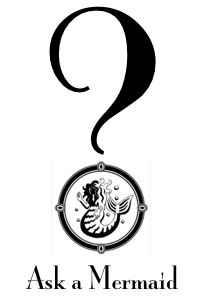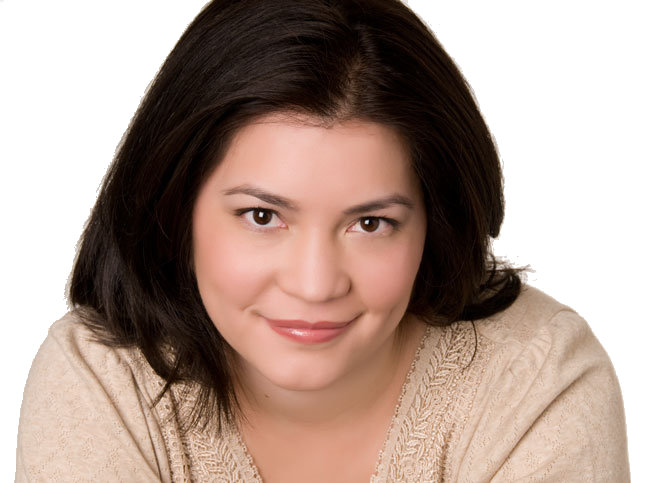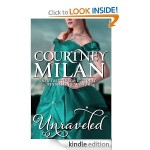
Have a question for Ask a Mermaid? Shoot us a line.
Normally, Ask a Mermaid is limited to one question and a handful of answers. However, when Courtney Milan agreed to answer all of our questions about determining profit and loss, how could we say no? The conversation started after this discussion on Dear Author about the hidden costs of 99-cent books. In the comments, Courtney revealed she runs a profit and loss analysis for each of her titles.
We had to find out more and Courtney agreed to come hang out in the Waterworld Mermaid lagoon and explain it all.
In writer terms, can you explain a profit/loss analysis is and why authors should implement one?
A profit/loss analysis is exactly what it sounds like: It’s a document (officially, I use a spreadsheet) that forces you to figure out what you would have to spend to do a particular project, and that projects what the potential profits are. In order to do this, you need to be able to figure out what you will need to spend money on—this is the easy part, although there are some tricky things involved—and to project about how much you’ll make.
Where were you at in your career when you start doing profit/loss extrapolations on your titles?
I did my first profit/loss when I was considering self-publishing. I compared what my contract offered me, and considered what my potential income was from both a self-publishing and a traditional publishing contract.
But there’s no reason why I shouldn’t have done one for my publishing contracts! One of the things that doing a P&L does is it forces you to think about what the return is that you’re getting on your investment.
What did you base your formula on or did you create it from scratch?
 A very long time ago, I read an article on a publisher’s P&L statement from Anna Genoese (available here), who is now a freelance editor, but at the time of writing, she worked as an editor for Tor. When I read it, I was still an infant in the world of publishing, so I took it simply as an interesting note—something to think about what publishers did.
A very long time ago, I read an article on a publisher’s P&L statement from Anna Genoese (available here), who is now a freelance editor, but at the time of writing, she worked as an editor for Tor. When I read it, I was still an infant in the world of publishing, so I took it simply as an interesting note—something to think about what publishers did.
When I was thinking about becoming a publisher myself, I decided that I needed to do a P&L statement of my own.
As Anna Genoese says on the linked page, the calculation there is firmly rooted in the old print era. But you can get the basic idea of what it’s about: You need to figure out all the places you’re going to spend money, and then try to figure out how much money you’re going to make.
Can you outline how you perform a profit/loss projection?
In order to do a P&L, you make two columns: Income and Expenses.
The easy column to figure out is expenses. I say that column is easy not because it’s not time-consuming, but because it is composed of expense items that are knowable before the fact. Your job is to figure out how much you are likely to spend on the production of a title. In order to do that, you need to walk yourself through the process of what you’d do to put the title out.
If you’re traditionally publishing, you might include:
- A prorated portion of expenses related to your computer, printer, internet connection, and office;
- The cost of research materials and research trips related to the project;
- A pro-rated portion of expenses for attending writing conferences during the year and dues paid to writing organizations; and
- The cost of print mailings, e-mail newsletters, bookmarks, promotional items, contest giveaways, and other forms of advertising.
If you’re self-publishing, you might include all of the above, plus:
- The cost of a developmental editor, a copy-editor, and proofreading;
- The cost of a cover;
- The cost of formatting a book;
- The cost of a copy-writer;
- The cost of an ISBN; and
- The cost of copyright registration.
Some people will be able to avoid a few of the line item costs by using their own time or the time of friends as a substitute, or by skipping some items altogether. For instance, most people write their own copy, or get friends to help them with it, and many people don’t get ISBNs, and those are perfectly reasonable choices to make.
The costs of these things are discoverable. Do research. Find out what average costs are for editors and covers and formatting. Ask yourself what a reasonable amount to spend on advertising is, and make yourself justify whether it’s worth the cost. Add a buffer amount, because inevitably, especially when you’re first starting out, you will make missteps—you’ll hire a proofreader because they’re cheap, and discover that they’re not actually very good and you have to pay someone else to redo the book. (I’ve done that, yes I have.) You’ll get a cover and send it to friends and they’ll say, “You know what? That’s terrible. You can’t put that out there.” (I have done that, too, yes I have.)
This will take a little work and research on your part, but it’s work and research that only needs to be done once; after you have your stable of good people, it’s a lot less work on a going forward basis. The first time is definitely the most time-consuming.
The hard part for a self-publisher is trying to estimate income.
(This is hard for traditional-publishers, too—you don’t know if you’ll earn out your advance, if you’ll sell foreign rights, etc.—but at least you know what your advance actually is.)
To estimate income for self-publishers, we use a trick used by traditional publishing. They estimate income by looking at “comps”—that is, it tries to identify books that are comparable, and uses the sales from those books to estimate the sales potential of your books.
So in order to project your income, you need to figure out who you are comparable to, and that is not easy. This is what you need to do. You need to identify authors who are already publishing who are (a) at your approximate stage of your career, (b) write in the same subgenre, and (c) have the same reach as you in terms of social media and fanbase. You need to estimate what their sales are.
Pause for a second. You may be wondering how you can estimate another author’s sales. There are three methods that I can think of.
1. Find people who share sales numbers—there’s a lot of them in self-publishing! Look for people in your subgenre who are most like you.
2. Identify people who are like you and ask them directly if they’re willing to share sales numbers. Many of them are. If it’s someone who is a friend of yours, they may be more willing to share. If they’re someone who seems upfront about things, they’re probably willing to share. If it’s someone you don’t know who has never posted about their numbers? Enh. It can be considered kind of rude to ask about numbers, so don’t go around badgering people willy-nilly
3. Take a look at books written by people who are like you, look at their Amazon rank, and use Theresa Ragan’s handy-dandy sales ranking chart to try and estimate how many copies they’re selling a day, and from there, make a reasoned guess as to how many copies they will sell within a year.
There is substantially more variation in sales, though, for a digital self-published project as compared to a print one from a major publisher. For a print project, most publishers have a pretty good idea how many copies of a title they can get an account to take, with some variation allowed, and once a book is on a shelf, they have some good statistics as to how many of those books get returned.
For a digital project, it’s much harder. Some books take off right away. Some languish and never move. And there are numerous intermediate options.
When I was doing my estimates, I came up with a best guess scenario, a worst case scenario, and a holy crap, that would be awesome scenario.
Can you share an example of using your formula for one of your books?
 Absolutely. The first calculation I did was the calculation for Unraveled, which was the book I could have either sold to Harlequin or produced on my own.
Absolutely. The first calculation I did was the calculation for Unraveled, which was the book I could have either sold to Harlequin or produced on my own.
The expense part was pretty simple—just the application of time and elbow grease.
To find comps, though, was a little more difficult. I had one advantage, and that was that I had an example of a book and an author that was pretty similar to mine—that would be my own books. At the time I was making the decision, Unveiled had just released from Harlequin. Even though the price point was different, the Amazon rank + a sales ranking chart from the time allowed me to estimate about how many copies it was selling. I estimated that it would sell about 10,000 digital copies in the first year of its release, which at a price point of $3.99 would make me about $26,000 in income. That was my best guess scenario for Unraveled.
My worst case scenario was that it would sell about 3,000 copies in a year, for an income of $8,379. I don’t really want to identify what I used as a comp for that because pointing to another author’s book and saying, “This is the worst case” is really not a nice thing to do.
For my best case scenario, I used a comp from Gwen Hayes, whose short story Second Son of a Duke had been eating up the charts. She told me how many copies she’d sold in a few months, and what the tail-off effect was over time. I extrapolated from that that my best-case scenario would be that I sold around 20,000 copies in a year, for a total of $51,850 in income.
In my case, I was running tandem P&L reports, because I also had a contract offer from Harlequin on the table. They offered me $35,000 for the next book, and I was fairly certain that it would take me a very long time to earn out that amount, so that meant I would be getting $29,750 (after my agent’s cut). I’d also have fewer expenses.
So if I only looked at the first year of my P&L, I would have said to go with Harlequin’s offer. But year two was where I thought I would get ahead: I projected about half the sales from year 1 in year 2, making the worst case scenario $12,568, the best guess scenario $39,000, and the best case scenario $77,775.
Doing the P&L this way forced me to accept that I was taking a risk—that there was a real chance that I would lose money by turning down Harlequin’s offer—but that the upside potential for the book was much, much larger by choosing to self-publish.
Note that there are two things that factor into this calculation:
1. How risk averse you are, and
2. What you think the time-value of money is.
If, for instance, I had needed the income from my writing to live on, I’m not sure I would have turned down Harlequin’s offer. It is hard to turn down money you need to pay the rent today with the possibility that you might end up on the streets glaring you in the face. Second, it’s always possible that I could make money into years three, four, five, and six—in fact, even from year sixty—from both my traditional and self-publishing contracts. The truth is, though, that making $10,000 sixty years from now is not the same as making $10,000 now. I have to figure out how much I value having money sooner. What I end up doing to approximate the time-value of money is to make some reasonably positive assumptions about years one and two for all cases, and to neglect the income from years three to infinity. Since I’m doing this for decision-making reasons alone, I don’t feel badly about that. If I were presenting this information to a bank or a decision-making body, I’d have to do a better job at estimation, but I don’t.
As a note: At this point, I don’t use any comps but my own books, and I tend to be very conservative about the performance of my own books.
It turns out that with the exception of two projects, I have consistently exceeded even my best-case scenarios. My estimates are probably too conservative. I don’t plan to adjust my calculations, though—it’s good for me to remember that even though things are going well now, there are no guarantees for the future.
***
Curious about how you can implement Courtney’s profit and loss system yourself? You’re in luck! Courtney is diving back into the Waterworld Mermaid lagoon tomorrow to explain how you can do that and more.



















 And if you want extra exposure let them know you’re willing to guest spot for their readers. Maybe throw in a nice book or swag giveaway while you wait for the reviewer to read your book.
And if you want extra exposure let them know you’re willing to guest spot for their readers. Maybe throw in a nice book or swag giveaway while you wait for the reviewer to read your book.